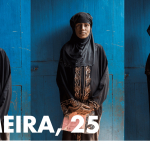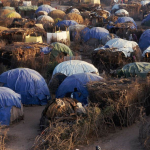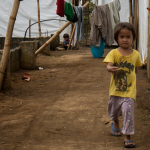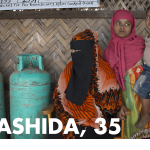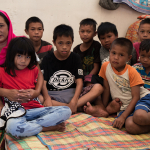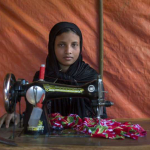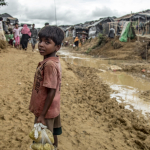There are more than one million Rohingya refugees currently packed into a tiny area of eastern Bangladesh. Kutupalong-Balukhali ‘mega-camp’ became the world’s largest refugee camp when hundreds of thousands of Rohingya Muslims fled a brutal military-led crackdown in neighbouring Rakhine State, Myanmar, in late August 2017.
Just over six months after the Rohingya refugee crisis first began, Action Against Hunger continues responding and adapting its humanitarian services to meet the urgent needs of newly arrived refugees. Action Against Hunger is the lead humanitarian INGO in Bangladesh, collaborating with the United Nations to provide emergency water, sanitation and hygiene interventions to help prevent outbreaks of waterborne diseases such as cholera, typhoid and dysentery within the camps. Our teams are also providing vital hot meals, as well as life-saving medical and nutritional treatments, and psychological ‘first aid’.
The level of acute malnutrition in the camps is significantly above the emergency threshold, according to the World Health Organisation, and mothers and children are at highest risk.
In Action Against Hunger’s 18 outpatient therapeutic centres and six in-patient centres, we have delivered vital malnutrition screening for 440,921 children and lifesaving nutrition treatment to close to 12,000 severely acutely malnourished (SAM) children.
Action Against Hunger Senior Health officer, Plaban Sakar, said “When the babies and children first arrived here they were often in a very bad state. We found that there were more severely acutely malnourished cases here than anywhere else in the world”.
We have also treated more than 16,000 pregnant and lactating women and with 50,000 babies predicted to be born in the camps over the next twelve months, the humanitarian need is ever growing.
When Roshida Begum arrived at Cox’s Bazar, she was referred to the Emergency Operation clinic. She fled from Rakhine state with her six children around six months ago when the militia attacked their village. “The journey here was terrible. The children were crying and terrified. They became very sick on the way”.
Another mother who visits the clinic is eight month pregnant, Humeira Begum. She fled her village in Rakhine State with her daughter and is now living in the Kutupalong refugee camp.
“I worry about my unborn child. What future will they have? I pray every day and night that I can feed my baby myself”.
At the clinic, Action Against Hunger staff provide mothers like Humeria with information on the importance of breast-feeding and on how to keep clean to prevent the spread of disease. Part of the clinic provides services for young children, allowing them to escape the traumatic day to day and interact with others who have had similar experiences.
“My little daughter enjoys coming here to the centre and playing with other children. But she doesn’t laugh as much as she used to and she doesn’t trust new people. Life in the camp is too hard,” Humeira said.
The Action Against Hunger team is also made up of over 100 psychologists and councillors, helping refugees like Humeira and Roshida deal with the trauma they have experienced. Humeira said, “I am trying to be strong for my children but I will never forget what happened to us. It makes me very angry and I often find myself crying. My children get upset too, so I hold them and we cry together. We are not here out of choice; we only want to find peace”.
This footage captures life in the world’s largest refugee camp, Kutupalong-Balukhali in Bangladesh, where Humeira and Roshida live.


